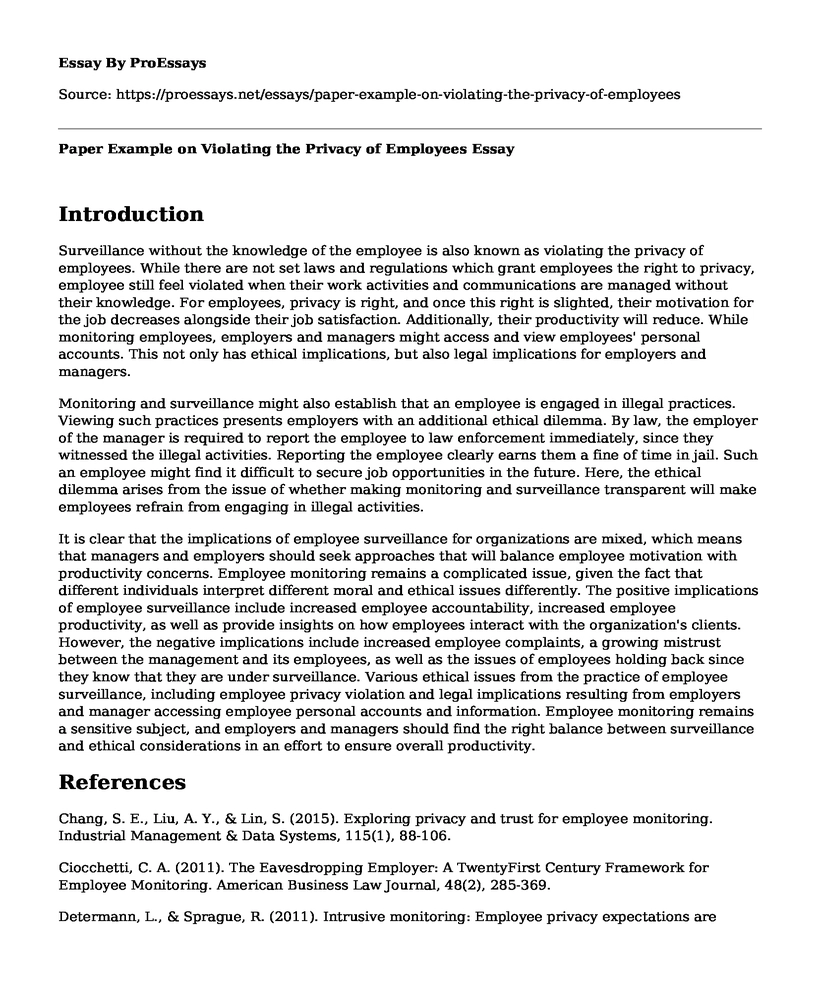Introduction
Surveillance without the knowledge of the employee is also known as violating the privacy of employees. While there are not set laws and regulations which grant employees the right to privacy, employee still feel violated when their work activities and communications are managed without their knowledge. For employees, privacy is right, and once this right is slighted, their motivation for the job decreases alongside their job satisfaction. Additionally, their productivity will reduce. While monitoring employees, employers and managers might access and view employees' personal accounts. This not only has ethical implications, but also legal implications for employers and managers.
Monitoring and surveillance might also establish that an employee is engaged in illegal practices. Viewing such practices presents employers with an additional ethical dilemma. By law, the employer of the manager is required to report the employee to law enforcement immediately, since they witnessed the illegal activities. Reporting the employee clearly earns them a fine of time in jail. Such an employee might find it difficult to secure job opportunities in the future. Here, the ethical dilemma arises from the issue of whether making monitoring and surveillance transparent will make employees refrain from engaging in illegal activities.
It is clear that the implications of employee surveillance for organizations are mixed, which means that managers and employers should seek approaches that will balance employee motivation with productivity concerns. Employee monitoring remains a complicated issue, given the fact that different individuals interpret different moral and ethical issues differently. The positive implications of employee surveillance include increased employee accountability, increased employee productivity, as well as provide insights on how employees interact with the organization's clients. However, the negative implications include increased employee complaints, a growing mistrust between the management and its employees, as well as the issues of employees holding back since they know that they are under surveillance. Various ethical issues from the practice of employee surveillance, including employee privacy violation and legal implications resulting from employers and manager accessing employee personal accounts and information. Employee monitoring remains a sensitive subject, and employers and managers should find the right balance between surveillance and ethical considerations in an effort to ensure overall productivity.
References
Chang, S. E., Liu, A. Y., & Lin, S. (2015). Exploring privacy and trust for employee monitoring. Industrial Management & Data Systems, 115(1), 88-106.
Ciocchetti, C. A. (2011). The Eavesdropping Employer: A TwentyFirst Century Framework for Employee Monitoring. American Business Law Journal, 48(2), 285-369.
Determann, L., & Sprague, R. (2011). Intrusive monitoring: Employee privacy expectations are reasonable in Europe, destroyed in the United States. Berkeley Tech. LJ, 26, 979.
Martin, K., & Freeman, R. E. (2003). Some problems with employee monitoring. Journal of Business Ethics, 43(4), 353-361.
Yerby, J. (2013). Legal and ethical issues of employee monitoring. Online Journal of Applied Knowledge Management, 1(2), 44-55.
Cite this page
Paper Example on Violating the Privacy of Employees. (2022, Jul 11). Retrieved from https://proessays.net/essays/paper-example-on-violating-the-privacy-of-employees
If you are the original author of this essay and no longer wish to have it published on the ProEssays website, please click below to request its removal:
- Law Essay Example: Gilbert Law Summaries on Constitutional Law
- Essay Example on Personal Values, Relation & Professional Ethics: Impact on Social Work
- Essay Sample on Leadership & Motivation: The Key to Successful Team Performance
- Addiction: A Study of Career Counseling in Relation to Holland and Work Adjustment Theories - Essay Sample
- Women, Guns and Personal Safety: Essay Sample on Linda Hasselstrom's Debate
- Essay Example on Antitrust Law: Efficiency or Justice?
- Free Paper Sample on Missouri Human Rights Act vs Fair Standard Act







